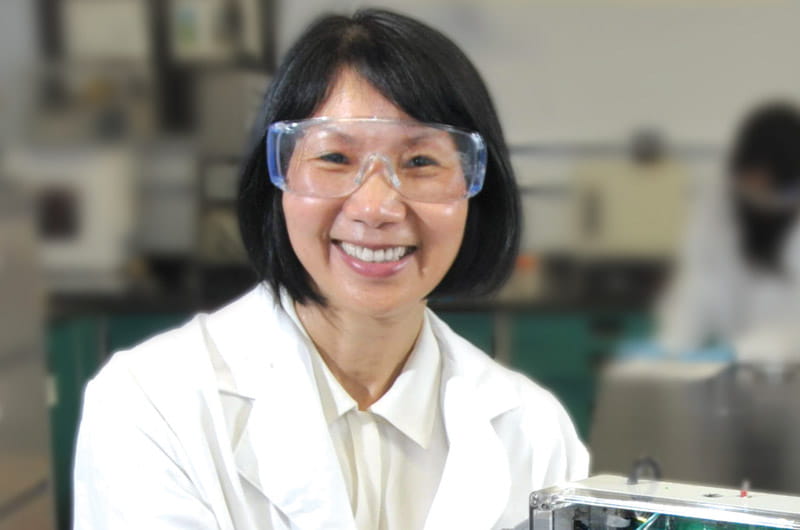Curiosity Fuels Drexel Professor’s Prolific Inventing
 By Frank Otto
By Frank Otto

Pandora was the first human woman, according to Greek mythology, which posits that she was created by the gods. She eventually became too curious and opened the box that became her namesake, releasing evil upon humanity.
Drexel biomedical engineering professor Wan Shih, PhD, on the other hand, has actually used curiosity to do the opposite, helping to shove some of that evil back into the box.
Shih, a prolific inventor with close to 30 patents tied to her name, has helped invent such items as the piezoelectric finger, which detects the tiniest tumors of cancer, and the piezoelectric plate sensors, whose exquisite sensitivity allows genetic detection without the need for gene isolation and amplification that is required by the current methods.
Piezo is derived from a word that means “press” in Greek. Shih said piezoelectricity is energy derived from pressure.
“I was just curious what you could do, what the capability was, what’s the limit, and how it applied to human tissues,” Shih said of the piezoelectricity. “That got me hooked on this discovery.”
In addition to her biomedical patents, she holds a patent with her husband, Wei-Heng Shih, another Drexel professor, and former Drexel student Huiming Gu, for a method of making mixed metal oxide ceramics and another for an “energy harvesting device.”
The number and quality of her inventions garnered a letter of nomination from colleague Banu Onaral, PhD, for a fellowship with the National Academy of Inventors. She was officially named one in December.
Part of the drive that helped Shih on her way to the fellowship is her inclination toward problem solving.
“You would think curiosity would be more tied to discovery than invention,” Shih said. “I think that people have different inclinations. I really enjoy making things.”
Originally a theoretical physicist, Shih found it didn’t fit her drive.
“I kind of felt not completely fulfilled, a disconnection from the real world problems,” she said. “So I switched to materials and was working on, at least, real materials. So that gave me some satisfaction. Then, going into biomedical was really the best thing that ever happened to me.”
Colleagues in biomedical engineering have helped Shih develop her inventions by presenting her with issues they’ve run into.
Take, for instance, the piezoelectric finger.
Shih said she was challenged by Professor Peter Lewin, PhD, and Calhoun Distinguished Professor Dov Jaron, PhD, to come up with something that might be able to detect tissues hardened beneath the skin by certain diseases.
Thus, the piezoelectric finger came about. The device can detect diseases in a patient that would have otherwise required the removal and dissection of a sample in a lab.
“Some tumors cannot be detected or felt by the surgeon but can be picked up by the piezoelectric finger, and that is so exciting,” said Shih, a cancer survivor herself. “It actually picked up a smaller, satellite tumor that was not predicted by either the surgeon himself or by mammography.”
But the road to such inventions is not a quick one. Shih and her husband had been working with piezoelectricity for many years before it was applied to the finger concept.
Shih moved through multiple disciplines of science before landing in biomedical engineering, where much of her inventing success has come.
Just because the road was long doesn’t mean it wasn’t worth the trip, though.
Shih said her understanding of the different aspects of science help her tackle problems in ways she might not have if she only ever specialized in one field.
“I do know a lot of basic principles and what things can do,” she said. “So my advantage is I do understand instrumentation from a very basic perspective and that is really the key.”
Shih continues to develop her ideas.
The piezoelectric plate sensor concept for gene identification could be huge since it does the identifying without the need for purifying or amplifying the DNA.
Overall, Shih said there is a specific satisfaction with being able to turn an idea into something acutely useful.
“If you are a dreamer, then you think, ‘Wow, this can be useful to mankind,’” she said. “And that makes me very happy.”
3301 Arch Street, 2nd Floor
Philadelphia, PA 19104